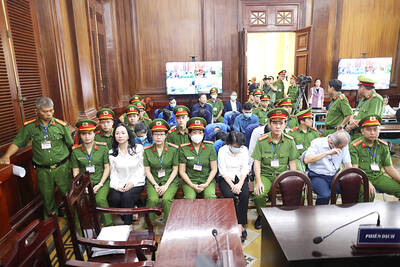The Australian parliament is set to probe alleged foreign interference at public universities, a government minister said yesterday, as concerns grow about Chinese influence.
A proposed inquiry by the security and intelligence committee follows a series of controversies over China’s clout on Australian campuses, ranging from hacks of university data to questionable financial donations and intimidation of Beijing’s critics.
Concerns have also been raised about the nature of research links between academics and scientists in the two countries.
Australian Minister for Population, Cities and Urban Infrastructure Alan Tudge told Sky News the mooted inquiry was the latest government attempt to tackle spiralling foreign interference now at “levels not seen since World War II.”
The move comes after Canberra announced last week that it was seeking new powers to scrap deals between local authorities and foreign countries that threaten the national interest — sweeping powers that would extend to universities.
It also comes less than a year after Australia announced new guidelines for universities for research collaboration, cybersecurity and international partnerships.
Tudge said the inquiry would “go further” than previous probes into alleged foreign interference.
“We need to be assured and the public need to be assured that there isn’t that foreign interference in our universities sector,” he said.
He did not say if the probe was aimed at China.
The Australian newspaper reported that Australian Minister for Home Affairs Peter Dutton outlined the terms of reference for the inquiry in a letter on Sunday to committee head Andrew Hastie, a government parliamentarian and outspoken China critic.
Advisers to Dutton did not respond to a request for comment.
The university guidelines announced in November last year push public institutions to enhance cybersecurity systems, undertake due diligence before signing partnerships with overseas organisations and train staff to recognize foreign influence attempts.
Beijing has repeatedly denied interfering in Australian campus life.

Republican US lawmakers on Friday criticized US President Joe Biden’s administration after sanctioned Chinese telecoms equipment giant Huawei unveiled a laptop this week powered by an Intel artificial intelligence (AI) chip. The US placed Huawei on a trade restriction list in 2019 for contravening Iran sanctions, part of a broader effort to hobble Beijing’s technological advances. Placement on the list means the company’s suppliers have to seek a special, difficult-to-obtain license before shipping to it. One such license, issued by then-US president Donald Trump’s administration, has allowed Intel to ship central processors to Huawei for use in laptops since 2020. China hardliners

A top Vietnamese property tycoon was on Thursday sentenced to death in one of the biggest corruption cases in history, with an estimated US$27 billion in damages. A panel of three hand-picked jurors and two judges rejected all defense arguments by Truong My Lan, chair of major developer Van Thinh Phat, who was found guilty of swindling cash from Saigon Commercial Bank (SCB) over a decade. “The defendant’s actions ... eroded people’s trust in the leadership of the [Communist] Party and state,” read the verdict at the trial in Ho Chi Minh City. After the five-week trial, 85 others were also sentenced on

Conjoined twins Lori and George Schappell, who pursued separate careers, interests and relationships during lives that defied medical expectations, died this month in Pennsylvania, funeral home officials said. They were 62. The twins, listed by Guinness World Records as the oldest living conjoined twins, died on April 7 at the Hospital of the University of Pennsylvania, obituaries posted by Leibensperger Funeral Homes of Hamburg said. The cause of death was not detailed. “When we were born, the doctors didn’t think we’d make 30, but we proved them wrong,” Lori said in an interview when they turned 50, the Philadelphia Inquirer reported. The

RAMPAGE: A Palestinian man was left dead after dozens of Israeli settlers searching for a missing 14-year-old boy stormed a village in the Israeli-occupied West Bank US President Joe Biden on Friday said he expected Iran to attack Israel “sooner, rather than later” and warned Tehran not to proceed. Asked by reporters about his message to Iran, Biden simply said: “Don’t,” underscoring Washington’s commitment to defend Israel. “We are devoted to the defense of Israel. We will support Israel. We will help defend Israel and Iran will not succeed,” he said. Biden said he would not divulge secure information, but said his expectation was that an attack could come “sooner, rather than later.” Israel braced on Friday for an attack by Iran or its proxies as warnings grew of